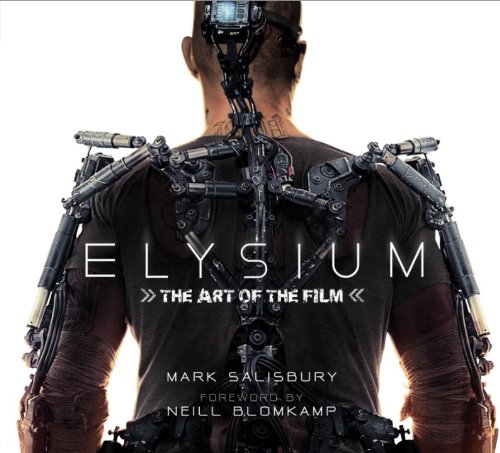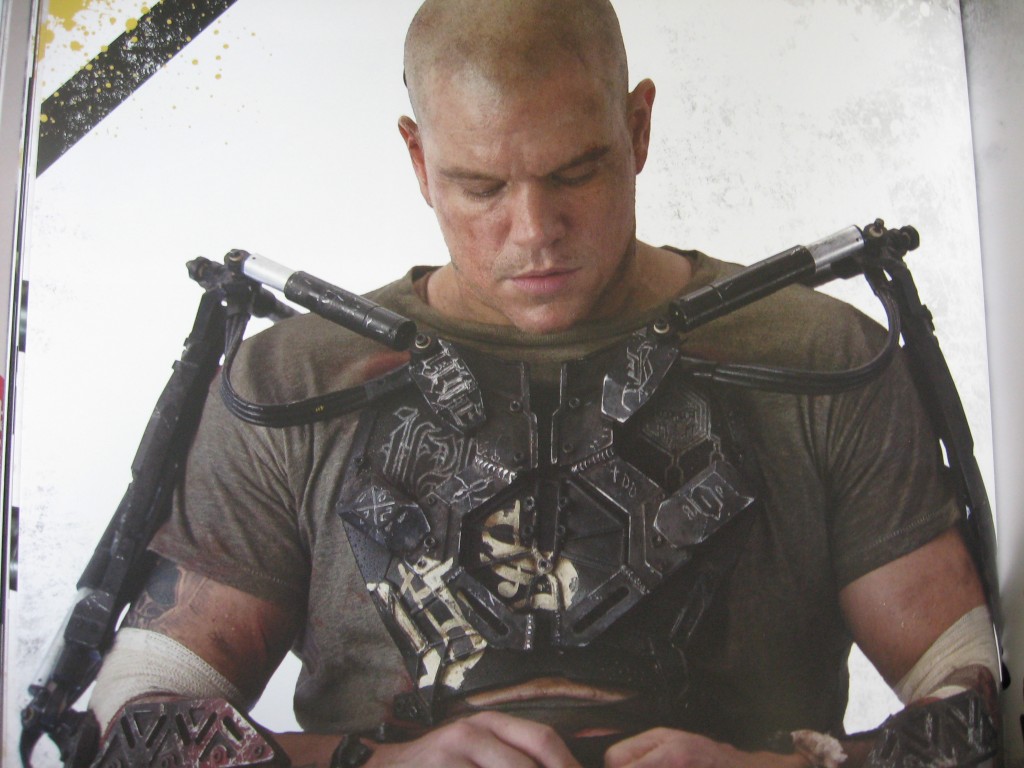One of the last big budget sci-fi adventures of this summer is Elysi um. Directed by Neill Blomkamp whose previous outing was District 9, a science fiction take on apartheid. This time Blomkamp shows us a future world where the line between the “haves and the have-nots” is the emptiness of space.
um. Directed by Neill Blomkamp whose previous outing was District 9, a science fiction take on apartheid. This time Blomkamp shows us a future world where the line between the “haves and the have-nots” is the emptiness of space.
In this dystopian future, the Earth is a diseased, dried up husk of a world. The inhabitants struggle just to survive while on an orbiting space station called Elysium the rich want for nothing. In contrast to the planet below, Elysium has fields of green, sprawling estates and instantaneous cures for all disease. All of which are denied those on Earth. Blomkamp paints a world that is very similar to our present day only with the division of the classes more defined. This is a frightening future but one must wonder if this is where we are headed.
The movie stars Matt Damon as Max, an ex-con who is trying to walk the straight and narrow but who cannot seem to catch a break within the system. After an accident at his factory job, Max is left with literally days to live. He then joins forces with a local criminal boss in exchange for passage to Elysium. The elaborate plan involves attaching an Exo-suit to the dying Max and having him steal information using a neural download.
Unbeknownst to either Max or his criminal employer the information they steal has the power to eradicate the division of the classes; this makes Max the prime target of the security forces of the Elysium government.
The worlds that Blomkamp creates spark the imagination but it is the tech that the designers at Weta Workshop and Syd Mead came up with that truly brought the story to  life. The designs and the process are beautifully laid out in Elysium: The Art of the Film from Titan Books. This oversized book (12.1 x 10.9 x 0.8 inches) is 176 pages of color artwork, designs and behind the scenes photos. Elysium: The Art of the Film is written by Mark Salisbury with quotes from cast and crew and a forward written by the film’s director, Neill Blomkamp, making this book a perfect companion for not just fans of the movie but also of science fiction.
life. The designs and the process are beautifully laid out in Elysium: The Art of the Film from Titan Books. This oversized book (12.1 x 10.9 x 0.8 inches) is 176 pages of color artwork, designs and behind the scenes photos. Elysium: The Art of the Film is written by Mark Salisbury with quotes from cast and crew and a forward written by the film’s director, Neill Blomkamp, making this book a perfect companion for not just fans of the movie but also of science fiction.
Elysium: The Art of the Film is divided, as the classes in the movie, into two distinct parts, Earth and Elysium. Each section has chapters that include weapon, ship and set design. The pages hold not just designs that made it onto the screen but the evolution from concept to fruition. Blomkamp’s collaboration with Weta Workshop has given his films a gritty realism that makes the fantastic believable. If only the artists at Weta Workshop could design real weapons it would be an amazing sight to see.
Titan Books has published some great movie tie-ins and Elysium: The Art of the Film is yet another. Even if you didn’t enjoy the film but are a fan of the movie design this is the book for you. Everything from the robots to the body armor to the airships and the guns is beautiful. If only they made toys from these designs I would be happier. Elysium: The Art of the Film retails for $39.99 and is worth the money.
- from Elysium: The Art of the Film
- From Elysium: The Art of the Film
- From Elysium: The Art of the Film
- From Elysium: The Art of the Film
- From Elysium: The Art of the Film
- From Elysium: The Art of the Film
- From Elysium: The Art of the Film
- From Elysium: The Art of the Film
- From Elysium: The Art of the Film










